The Bottom Line
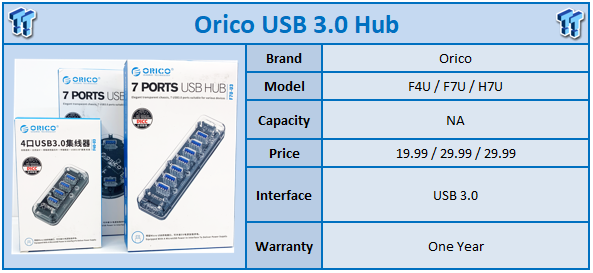
There are few products in the market that are simple, but we depend on them to work every day. While modern motherboards have finally caught up to our needs for connectivity, users that depend on notebooks or all-in-one machine need the ability to expand connectivity, and the USB hub does just that.
While many of us would just grab the cheapest off the shelf, not all USB 3.0 hubs are created equal. Orico has been designing and building PC peripherals for years, and one of their most recent releases is their lineup of USB 3.0 Hubs.
With both 4 and 7 port models in stick and round form factors, Orico is looking to cover as much of the market as possible with a budget-friendly solution that works. Model numbers for these units start with the 4-port F4U and 7 port F7U. The round form factor carries an H7U model number. All units use the same internal components with two VLI USB 3.0 controllers, a Micro B input and secondary USB input for additional power.
MSRP of the Orico USB 3.0 Hubs range from 19.99 for the 4-Port and $29.99 for the 7-Port models. Each unit has a one-year warranty.
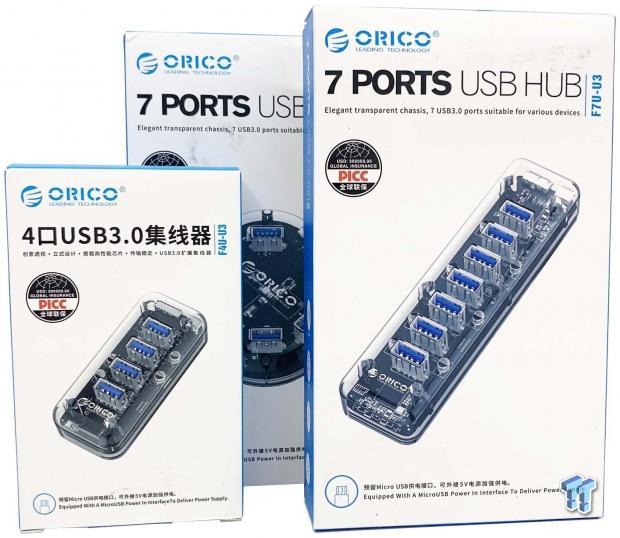
The packaging is modern with a two-tone white and blue design; we have images of the hubs on the front with branding above.
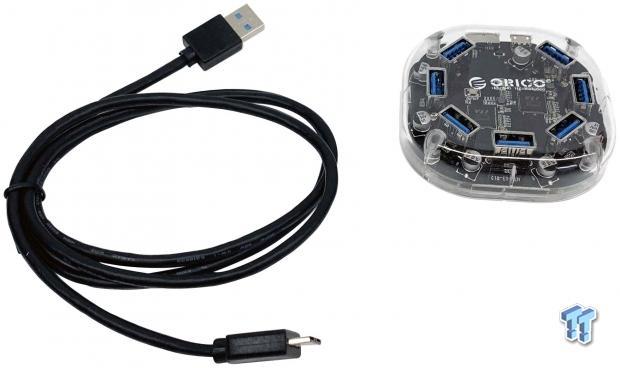
Each hub includes a USB 3.0 cable in the box.
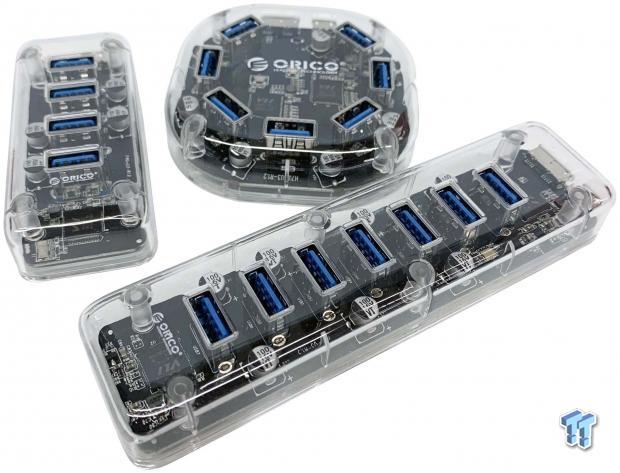
Above, we have all three hubs. They all share the same clear design along with port placement.
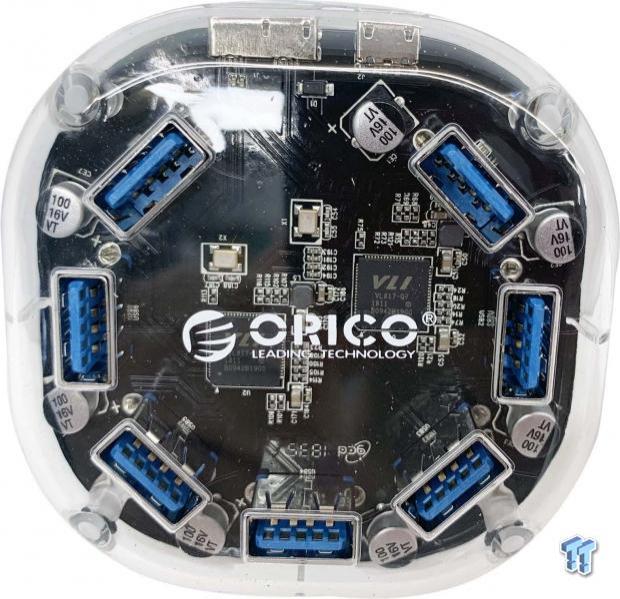
Looking a bit closer, we can see the internal components used in the hub. A good amount of capacitors aide in current spikes on each port.
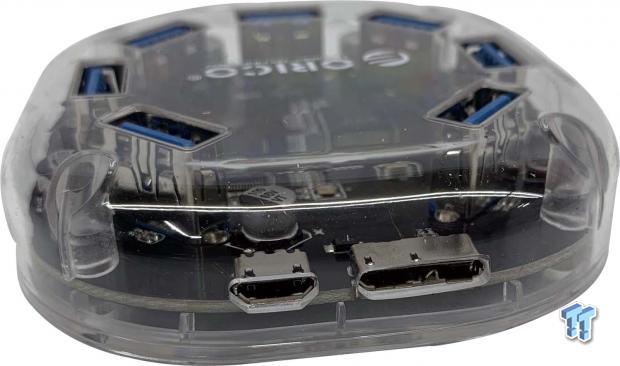
On the connectivity side, we have the data port to the right in micro USB 3.0 and additional power, if needed, to the left with micro USB.

The F4U and F7U offer a thinner more compact profile with the ports lined up.
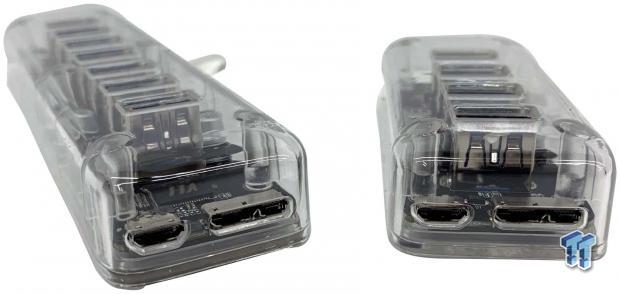
Again the same connectivity setup as the round model.
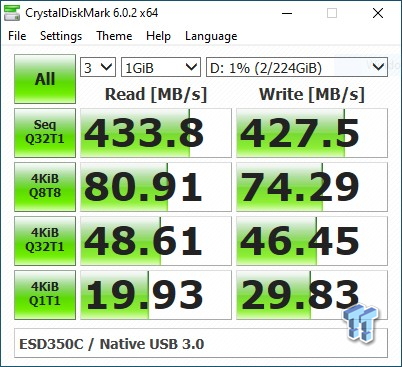
Testing the Hubs, I ran through each using a portable SSD in native mode and with the hub connected to see if there was any performance loss. I then took the worst results seen above. For our test system, our ESD350C SSD reached 433 MB/s read, and 427 MB/s write direct.
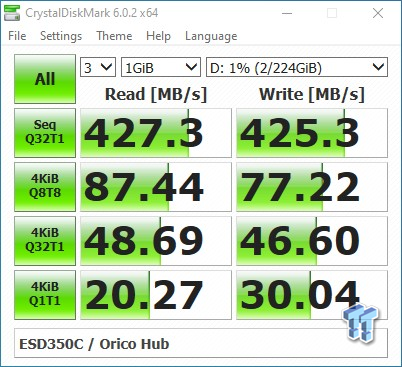
Adding in the Orico Hub, we see only a minor performance variance to 427 MB/s read, and 425 MB/s write.
To summarize, the Orico hubs are all pretty decent solutions. Of course, materials would justify some performance cost-cutting measure with the plastic enclosures, but the components all seem to be quite good. In testing, I was able to plug in portable SSDs, USB flash drives, and hard drives without needing extra power.
The performance was no issue for the hubs; all three produced similar results to the unit tested above. Peak results were 425 MB/s read and write.
As for pricing, the Orico hubs have their work cut out with so many players in the market. Comparable solutions for the 7 port include; Plugable and Amazon Basics at or around the same $29.99. The 4 port has the same level of competition from Anker, Amazon, etc.
Tyler's Test System Specifications
- Motherboard: ASUS Prime Z370 (buy from Amazon)
- CPU: Intel Core i3 8350K (buy from Amazon)
- RAM: Corsair Vengeance 32GB 4x8GB DDR4 3200 (buy from Amazon)
- Cooler: Corsair Hydro H115i (buy from Amazon)
- Case: Corsair Air 540 (buy from Amazon)
- OS Storage: Samsung 960 EVO 250GB (buy from Amazon)
- Power Supply: Corsair RM850x (buy from Amazon)
- OS: Microsoft Windows 10 (buy from Amazon)
- Wi-Fi NIC: ASUS PCE-AC88 (buy from Amazon)
- 10Gbe NIC: ASUS XG-C100C (buy from Amazon)
- Thunderbolt 3: ASUS Thunderbolt EX3 (buy from Amazon)
Performance |
90% |
Quality |
76% |
Features |
77% |
Value |
81% |
Overall |
81% |
With an extremely competitive market, the Orico Hubs offer legit throughput with a unique design.
Related Tags

